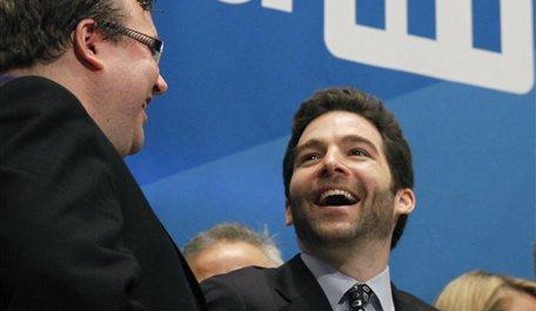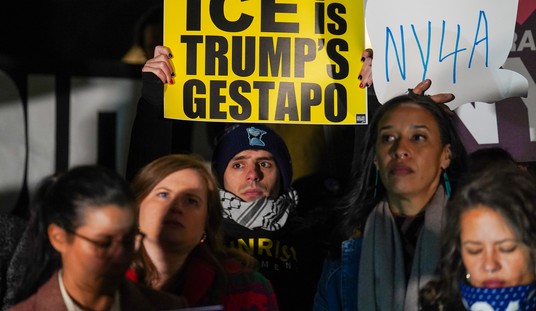America lost one of its most storied heroes yesterday, who left us after a lifetime of service and incredible bravery. John Hershel Glenn, the last of the legendary Mercury 7 astronauts as well as a combat pilot from World War II and Korea and a former Senator from Ohio, passed away after a short illness at the age of 95. Well after most men would have decided all of that was enough, Glenn managed to talk his way back into space in retirement, offering up one last pioneering foray as the oldest man to fly into the void at the age of 77.
The Washington Post offers up this reminder of Glenn’s most storied flight, as he became the first American to fully orbit the Earth in space. Their report also recalls the unexpected turn that the flight took on its way back into the atmosphere:
The flight, which took four hours, 55 minutes and 23 seconds, was uneventful until its final moments.
“As I got into the heat of reentry,” he told The Washington Post in 1987, “I glanced out the window, and there were big flaming chunks that were coming back by the window, back along the flight path, and . . . I can still see them to this day, they were so vivid. A lot of little sparks, pieces and so on, but good sized chunks [too]. And I couldn’t be certain at that time whether it was the retro-pack or the heat shield. So that caused considerable apprehension.”
It was the heat shield, which had come loose from the force of reentry. A light flickered on at mission control warning that the shield could come off. Everyone in that engineer bunker knew that the spacecraft might burn up, and Glenn with it.
There was nothing but silence for a few, harrowing minutes as communications were cut by the ionization barrier that built up around the plummeting rocket. Then, a moment after splashdown, Glenn’s voice came across the radio saying, “Boy, that was a real fireball!”
As a boy born the year after that flight, and the son of a father who spent 29 years working in the space program (Gemini, Apollo, and Space Shuttle programs), astronauts were my earliest heroes, albeit it kind of a generic way. Not until I was a little older did I begin to learn the nuances of the individuals who rode the rockets and blazed the first trails to the moon and the stars, which in a way was kind of a shame. Their heroism stands out in starker relief when their humanity is most recognized.
Glenn took those enormous risks for his country long before the space program. We just commemorated Pearl Harbor Day; when the attack took place, Glenn attempted to enlist in the Army, but wound up in the Navy instead, later transferring to the Marine Corps to become a combat pilot. He fought in the Pacific and for a time flew the same plane that my late father-in-law flew, the Corsair. Glenn flew 59 combat missions in WWII and then returned to fly 90 combat missions in the Korean War, where he began a lifelong friendship with Boston Red Sox legend Ted Williams. He also flew into flak so often that his fellow pilots dubbed him “Magnet Ass.”
After the war, Glenn became a test pilot, eventually logging more than 9,000 hours of flight time. By 1958, NASA began looking for test pilots for its Mercury program, and that story is well enough known to moot the need for a recap here. The book and film The Right Stuff highlights Glenn’s heroism and dedication, even if it does take cheap shots at the first Mercury 7 astronaut to leave us, Virgil “Gus” Grissom, who died in the Apollo 1 accident along with Ed White and Roger Chaffee.
Glenn eventually turned to politics, serving four terms in the US Senate, and running once for the Democratic presidential nomination in 1984. His 24 years in politics was mainly focused on national security and the space program. Glenn did get caught up in the S&L scandal in 1989, but Ohio voters forgave him and elected him to one final term in office in 1992. It was during that final year in office that Glenn returned to space after spending two years offering his services to NASA as a test subject for geriatric studies in space. In his memoir, Glenn wrote that he had not been told of their decision to allow his return until they announced it publicly. He rode the STS-95 mission and returned to receive a ticker-tape parade — more than fifty years after his first tours of duty as a Marine combat pilot.
As we find out about our real heroes, not everything they touched was golden, but no one can doubt Glenn’s bravery and dedication to the United States of America and his status as an authentic pioneer. We were blessed to have Glenn and so many others who sacrificed for our nation in even more profound ways. Godspeed, Mr. Glenn, and may your reunion with your six comrades of the Mercury program be as joyful as your love of country.








Join the conversation as a VIP Member